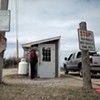Erick Diaz, an undocumented Mexican farmworker who milks cows on an Addison County dairy farm, remembers being pleasantly startled by his first trip to Vermont's Statehouse. He'd trekked the hour and a half to Montpelier — after getting a coworker to cover his milking shifts on the farm — to explain to lawmakers why Vermont should issue driver's licenses to undocumented farmworkers.
"I was very surprised, because you just walk into the Statehouse, and [the representatives] allow you to talk and they hear your voice," said Diaz, who spoke with Seven Days yesterday by phone. "It was pretty amazing."
Lawmakers, it turns out, were listening. Today, Gov. Peter Shumlin will sign into law the bill that Diaz — along with many other migrant farmworkers and their advocates — campaigned hard to pass this legislative session. The new law will allow Vermont to issue so-called "operator's privilege cards" to individuals regardless of immigration status, for the first time giving undocumented immigrants the legal ability to drive on Vermont's roads.
The bill passed the Vermont House in a 105-39 vote last month, after winning similarly overwhelming support in a 27-2 Senate vote in April. Diaz and his compatriots will have to wait until January 1 to apply for the new card, but he says he's hopeful that the change will radically improve the quality of life for the estimated 1500 undocumented farmworkers living in Vermont today.
"We are so excited waiting for January 1," said Diaz. "I'm pretty sure this is going to change our lives completely."
Diaz has been working in the United States illegally for nearly three and a half years. He made the trip north from the Mexican state of Chiapas after his brother found work in New England. Diaz landed first in Maine, and last February moved to Vermont. He didn't have a background in farming before coming to the United States — "I just learned once I got here," he said.
But life as an undocumented worker on a Vermont farm — particularly without a driver's license — is hard. Right now migrant workers are fully dependent upon other drivers to meet basic needs like going to the grocery store, attending church services or making a doctor's appointment. Occasionally that can mean waiting for weeks between trips to stock up on fresh food. "Sometimes our bosses give us rides," says Diaz. Other times, "We have to find people who want to support us." And if that doesn't happen? "We just have to wait. That's the way we are now."
Diaz, like many migrant farmworkers, is already studying for the driver's exam he'll have to take to qualify for the new card. Applicants for the operator's privilege card will have to pass all of the same tests required of someone applying for a traditional driver's license.
The bill isn't perfect, according to advocates from Migrant Justice. Activist Brendan O'Neill says the group initially campaigned hard for a card that would be equal in appearance to a traditional driver's license — the hope being to avoid a "scarlet letter effect" that brands its carrier with a de facto sign of immigration status.
Ultimately, the legislature settled on what could be called a compromise. The new cards will be different from traditional driver's licenses. They'll be called "operator's privilege cards," and won't be accepted as a form of federally recognized identification under the still-pending REAL ID Act of 2005. In fact, the card will even be marked "not valid for federal use."
That said, O'Neill hopes it won't single out migrant farmworkers, because any Vermont resident who wishes to can obtain one of the new cards. Given the broad coalition of people and groups opposed to the REAL ID Act — including the ACLU, libertarian groups, immigrant advocacy groups, and human and civil rights organizations — O'Neill finds it perfectly conceivable that some Vermonters might choose the new card for philosophical reasons.
"In fact, I'm going to get one," says O'Neill. "Our goal is to sign up as many Vermont residents [as possible]. We want to normalize it. ... The law itself doesn’t create exclusion, but in practice we want to make sure that’s true by getting as many Vermonters to join."
Vermont isn't the first state to allow undocumented immigrants legal driving privileges; New Mexico, Washington state and Utah already have laws on the books granting driver's licenses regardless of immigration status, and a handful of other states — including Connecticut, Maryland, Illinois and Nevada — passed similar legislation earlier this year. Several others are still considering the proposition. O'Neill says the Vermont law is fully compliant with federal law, and won't put the state at risk of losing any federal highway funding.
U.S. Immigration and Customs Enforcement — which polices a broad swath of Vermont in the name of border control — declined to comment on the new law, citing a policy of not commenting on pending legislation.
Looking ahead to January 1, Diaz says he's not worried about the logistics of buying a car or obtaining access to a vehicle, once he's licensed. The bigger hurdle, says Diaz, will be a psychological one: He predicts that he and other farmworkers may still be afraid to venture out into the wider community, even armed with a legal mechanism for driving. After so many months and years of laying low, he says, striking out independently is a frightening prospect.
Still, he adds, "We have to get out of those shadows."
The photo above is a still from "Hide," a documentary made by former Middlebury College students Peter Coccoma and Elori Kramer, released in January and covered in Seven Days. The film exposes the harsh working conditions of undocumented farmworkers in Vermont.


















































